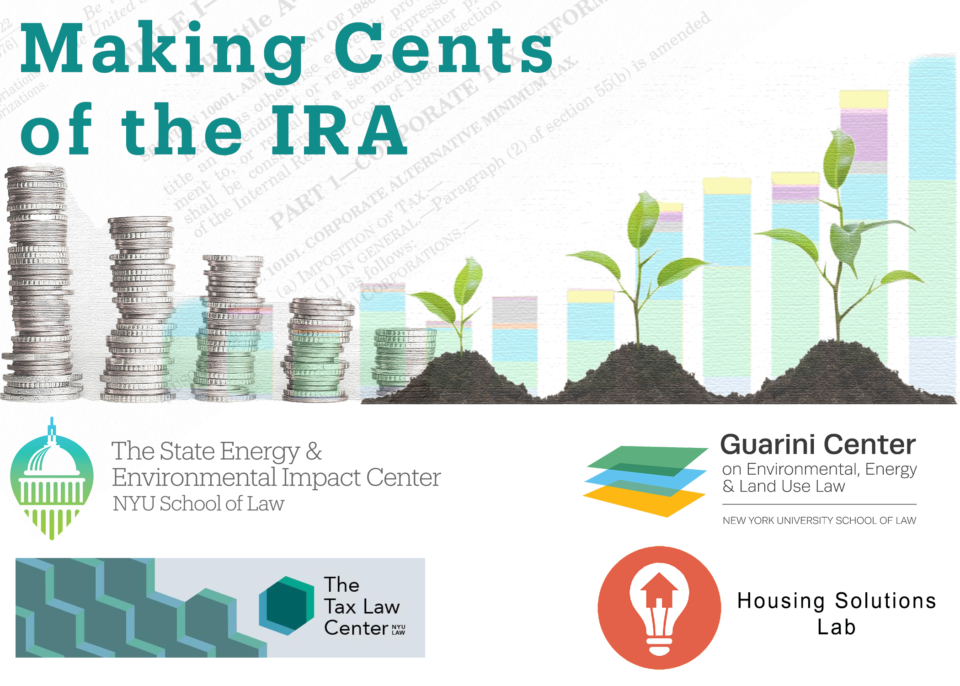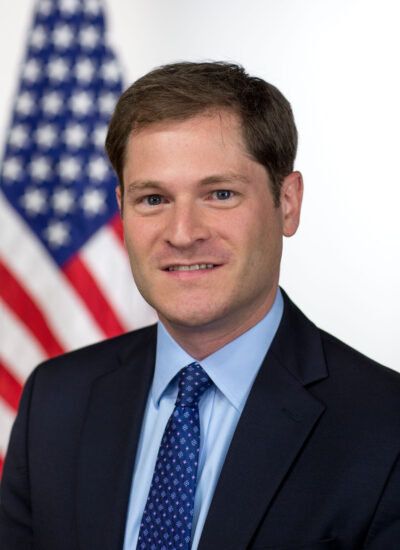
The Inflation Reduction Act provides many funding opportunities for state and local government officials. Thank you for joining the State Energy & Environmental Impact Center, Guarini Center for Environmental, Energy and Land Use Law, the Housing Solutions Lab at the NYU Furman Center, and the Tax Law Center at NYU as we hosted a workshop for state and local government officials on funding opportunities in the Inflation Reduction Act (IRA). The workshop also covered how state and local governments can receive their IRA tax credits through “direct pay.” A Q&A session followed the panelist presentations and discussion.
Event Video
Presentations
Chris Castro from the Department of Energy’s Office of State and Community Energy Programs gave an overview of the newly created office’s goals and how it intersects with the IRA
Michael Kaercher from NYU’s Tax Law Center presented on the funding opportunities that the Inflation Reduction Act may provide
Speaker Bios + Contact Information

Seth Hanlon
Deputy Assistant Secretary for Tax and Climate Policy, U.S. Department of the Treasury
Seth Hanlon serves as Deputy Assistant Secretary for Tax and Climate Policy in Treasury’s Office of Tax Policy. He was previously a senior fellow at the Center for American Progress focusing on tax and economic policy. Prior to rejoining American Progress in 2017, he served as special assistant to the president for economic policy at the White House National Economic Council, where he coordinated the Obama administration’s tax policy. He has also served as senior tax counsel for the House Budget Committee Democratic staff under former ranking member Rep. Chris Van Hollen (D-MD) and as tax counsel for Sen. Debbie Stabenow (D-MI), a senior Finance Committee member, among other Capitol Hill roles. He was the Director of Fiscal Reform during a prior stint at American Progress and an associate attorney at Caplin & Drysdale, Chartered, where he advised corporations, individuals, and non-profit organizations on tax law.

Chris Castro
Chief of Staff, Office of State and Community Energy Programs, U.S. Department of Treasury
Chris Castro is the Chief of Staff for Office of State and Community Energy Programs at the U.S. Department of Energy. Castro previously served as the Senior Advisor to Mayor Buddy Dyer and Director of Sustainability & Resilience at the City of Orlando, Florida. Castro is well known for his entrepreneurial efforts prior to coming to the City, including being the Co-founder and President of several companies and organizations, including the global sustainability nonprofit, IDEAS For Us, a clean energy consulting firm, Citizen Energy, and a renowned urban farming social enterprise, Fleet Farming. In 2020, Chris also joined partners as a Founding Director to launch Climate First Bank, the first B-Corp community bank in Florida working to advance ESG and local investing for sustainability and decarbonization solutions. Originally from Miami, Florida, Castro holds a B.S. in Environmental Science and Policy from the University of Central Florida.

Michael Kaercher
Senior Attorney Advisor and Director of the Climate Tax Project at the Tax Law Center at NYU Law
Mike Kaercher is a Senior Attorney Advisor and Director of the Climate Tax Project at the Tax Law Center at NYU Law. He has over a decade of experience on a broad range of complex federal tax issues. Kaercher currently focuses on leading the Tax Law Center’s work on the implementation of the climate tax provisions of the Inflation Reduction Act, as well as contributes to the Center’s work across a range of other issue areas.
Prior to joining the Tax Law Center, Kaercher spent two years on detail to the House Ways and Means majority tax staff. While there, he designed and advanced tax policy in various substantive areas, including green energy tax policy, excise taxes, and COVID relief.
For seven years, he was an employee of the Office of Associate Chief Counsel (International) at the IRS, where he advised the IRS on interpretation, administration, and enforcement of various international tax regimes, including the Foreign Account Tax Compliance Act (FATCA), the Global Intangible Low-Taxed Income (GILTI) regime, and the Subpart F regime. In that role, he also drafted certain regulations and other guidance related to these regimes.
Prior to joining the government, Kaercher was an associate at Ivins, Phillips & Barker, and at WilmerHale, where he advised large corporations and universities, primarily on employee benefits matters.
Kaercher holds a JD from Harvard Law School, and a BA from Colgate University.
Kaercher is admitted to practice law in Washington, DC and Maryland.

Chye-Ching Huang
Executive Director of the Tax Law Center at NYU Law
Chye-Ching Huang is the Executive Director of the Tax Law Center at NYU Law. Before starting the Tax Law Center, Huang was senior director of economic policy for the Center on Budget and Policy Priorities, where she worked on the analysis and design of a wide range of federal tax, fiscal, and economic policy proposals, in collaboration with tax academics, practitioners, analysts, and advocates.
Huang has written on a wide range of federal tax and fiscal and economic policy issues, testified several times before Congress on tax issues, and appears regularly in the media.
Previously, Huang was a tax academic at the University of Auckland in New Zealand, where she published research on tax law, policy, and regulation, and taught graduate and undergraduate tax law. She also practiced in tax for New Zealand commercial law firm Chapman Tripp. She has consulted for the International Budget Partnership on fiscal policymaking processes and institutions.
Huang holds an LLM from Columbia Law School, where she was a Sir Wallace Rowling/Fulbright and James Kent Scholar, and a Bachelor of Law (Honours) and a Bachelor of Commerce in Economics from the University of Auckland in New Zealand.
For any further questions please contact
Scott Arceneaux at the Treasury Department - [email protected]
Further Resources
- You can track the guidance that Treasury and the IRS have released here: https://www.irs.gov/credits-and-deductions-under-the-inflation-reduction-act-of-2022
- Seth Hanlon from Treasury has flagged this website as a helpful resource: http://cleanenergy.gov/
- We invite you to follow and subscribe to our cosponsors to receive more information on the Inflation Reduction Act and other important news
- Tax Law Center at NYU Law: https://nyu.us14.list-manage.c...
- Guarini Center on Environmental, Energy, and Land Use Law: https://guarinicenter.org/abou...
- The Housing Solutions Lab at the NYU Furman Center: https://localhousingsolutions....
Q & A
Below you will find questions that the audience wrote in and were answered during the event
Are municipalities able to get Direct Pay benefits for energy efficiency upgrades on city facilities?
I think you are probably referring to the Energy efficient commercial buildings deduction under 26 USC 179D. The structure of that provision -- as a deduction rather than a credit -- makes it impossible to direct pay.
However, a government can still access the provision through a rule that allows this deduction to be transferred to the designer (usually the architect).
Is ITC based on build cost?
The ITC [is] generally a 30% credit based on the basis of the property. The lions share is build cost. But there are various adjustments depending on facts and circumstances.
Do charging infrastructure credits apply to hydrogen fueling stations?
Yes
Will the transition rule for EV tax credit be updated to allow those who reserve an EV before the new rule changed last year but have not received delivery yet?
Just noting that those rules relate to the consumer clean vehicle credit. They do not impact the commercial clean vehicle credit that states and cities can access.
For [the] Rooftop Solar example, could this be applied to a solar PPA?
The credit goes to the party who places the property into service. If the state or city is accessing clean electricity through a PPA, then that city/state will not be the taxpayer who receives the credit.
If Cities have active building efficiency projects happening that will save 30% or more energy, what do we need to track/turn-in for payment? How do we apply for the building energy efficiency tax credit payout?
Are you thinking of the Energy efficient commercial buildings deduction under Section 179D? If so, then this not eligible for direct pay. Instead, the deduction can be transferred to the designer. See 179D(d)(3)(A)
Who/When/How will determine what constitutes an “energy community”?
Energy Commnunity means:
(a) a brownfield site;
(b) a metropolitan or non-metropolitan statistical area which has or had at any time during the period beginning in 2010, 0.17% or more direct employment or 25% or greater local tax revenues related to the extraction, processing, transport, or storage of coal,
oil, or natural gas, and has an unemployment rate at or above the national average unemployment rate for the previous year; or
(c) a census tract in which after
December 31, 1999, a coal mine has closed, or after December 31, 2009, a coal-fired electric generating unit has been retired, or a census tract directly adjoining to any census tract as described in subsection (c).
I would stay tuned for additional guidance.
How does one apply [for direct pay]? The link on IRS website does not provide much direction.
For direct pay, those mechanics will be part of future guidance.
